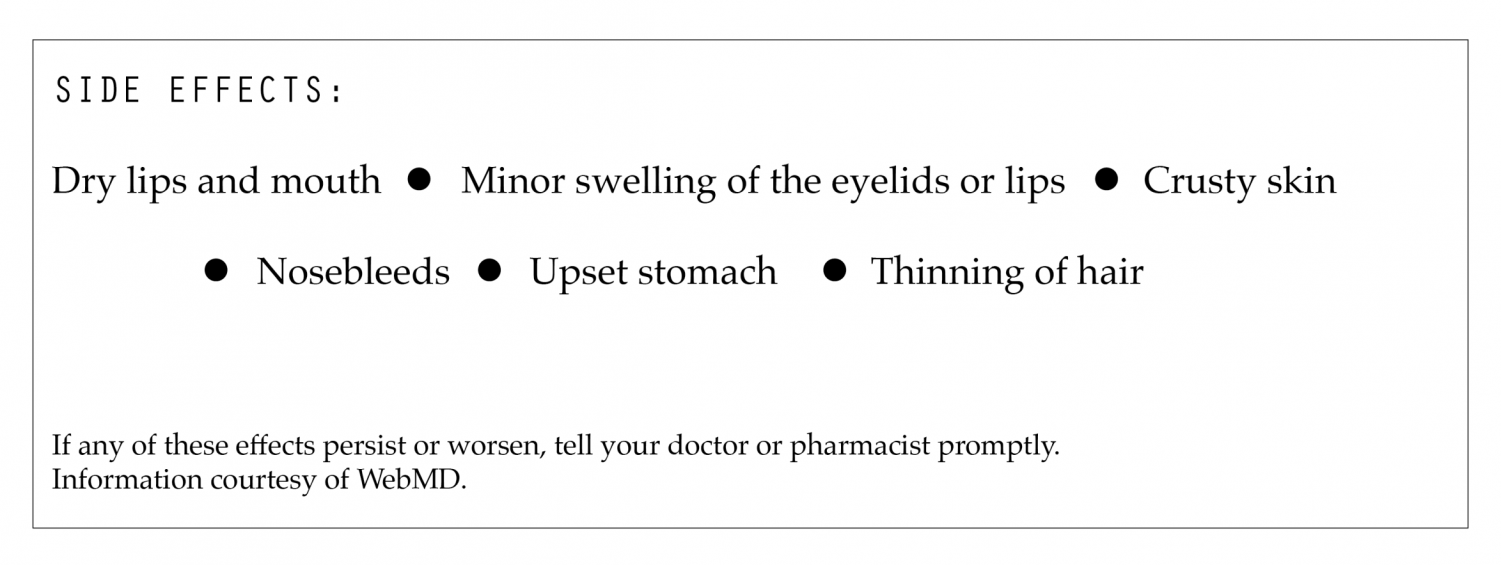College-aged students advised not to use acne-curing drug
August 30, 2018
Even though there is a drug that is considered a cure for acne, dermatologists will prescribe anything else to college-aged students before using it due to the potential risks it can cause to its patients.
This medication is Isotretinoin, which is basically a retinoid or a strong derivative of vitamin A. When a high dose of vitamin A is taken, it can decrease the amount of sebum oil in the body which will then decrease the severity of acne.
Since the age of 12, Nikki Schulz, a 22-year-old senior psychology major at Georgia Southern University, has been seeing a dermatologist for her acne. Since then, she has experimented with various medications, ointments and face washes to be able to manage the deep, painful cystic acne.
“Well, when I was 21 and my acne was still really bad, I didn’t think that was normal,” Schulz said. “It was getting to the point where it was painful, the cystic acne. So, I just decided it was time [to try Isotretinoin]. I tried everything else.”
Schulz started Isotretinoin at the end of 2016 and stayed on the medication for a course of about nine to ten months. The average length of treatment lasts between five to six months.
According to the American Academy of Dermatology, 85 percent of people between the ages of 12-24 experience some form of acne. For patients on Isotretinoin though, the acne is far worse as they experience painful cystic acne that goes far deeper in the skin.
Many patients that are recommended for Isotretinoin have become resistant to all other forms of treatment and when they stop treatment, they will experience very little to no acne.
According to Dr. Morgan Thakore, dermatologist at Harmonie Medical in Evans, Georgia and assistant professor of dermatology at Augusta University, dermatologists will treat regular acne with other options first.
“The main concern with it is females that are on Accutane [Isotretinoin] cannot get pregnant while they’re on the medicine so that’s why it is very closely regulated,” Thakore said.
Schulz said that her doctors made sure that she was taking the necessary precautions.
“They did make sure I was signing off, that I was taking a birth control pill and made sure that if I was having sex, we were using condoms,” Schulz said.
Side effects for pregnant women
Although this medication can be beneficial to people who experience painful cystic or nodular acne, this drug is quite controversial. The main issue is female patients who get pregnant while taking the drug, regularly experience miscarriages.
“Due to the risk of severe birth defects and/or death to a fetus exposed to the drug in-utero, any woman who is pregnant or may become pregnant should never take the medication,” Dr. Brian DeLoach, medical director at GS’ Health Services, said.
If a patient were to get pregnant with high doses of vitamin A in her system, it could cause a miscarriage, premature birth, birth defects or even developmental/intellectual disabilities.
Since the early 1980s when the company Roche put Isotretinoin on the market under the brand name Accutane, programs have been implemented to prevent patients from getting pregnant while on it. Some of these have included the Accutane Pregnancy Prevention Program, the System to Manage Accutane Related Teratogenicity and iPledge programs.
iPledge
Today, there is the iPledge program, which is a national database where each patient, prescriber and pharmacy must be certified before being able to work with the Isotretinoin medication.
The iPledge program currently requires female patients to sign a contract, stating that if they are to engage in sexual intercourse, they will use two forms of birth control. Not only that, but they are subjected to monthly pregnancy tests, blood panels and quizzes before they can get their next prescription.
Despite the efforts to prevent pregnancy, a study published in the Journal of American Academy of Dermatology found that there are approximately 2.7 pregnancies for every 1,000 treatments of Isotretinoin.
If a woman were to get pregnant, she would need to immediately talk with her doctor, according to Thakore.
“It can cause very bad developmental outcomes so it’s usually something if a female were by chance to get pregnant while they’re taking the medicine. Typically, they would have to terminate the pregnancy or they would be very likely to miscarry,” Thakore said. “We do very extensive counseling regarding that.”
This does not mean that female patients are forced to abort the child, but rather that they would need to go to counseling to figure out their options moving forward.
Unlike females, males are not subjected to the same regulations. Before receiving each prescription, they only need to check up with their doctor once a month and then answer the questions via the iPledge website.
Despite the potential risks, Thakore explains that it can still be a great option for those suffering from severe acne.
Thakore said, “We certainly don’t always start with it but a lot of times if people have really bad acne and tried and failed lots of other things, then Accutane [Isotretinoin] can be a great medication.”
Tara Bailey, The George-Anne Enterprise reporter, gaspecial@georgiasouthern.edu








